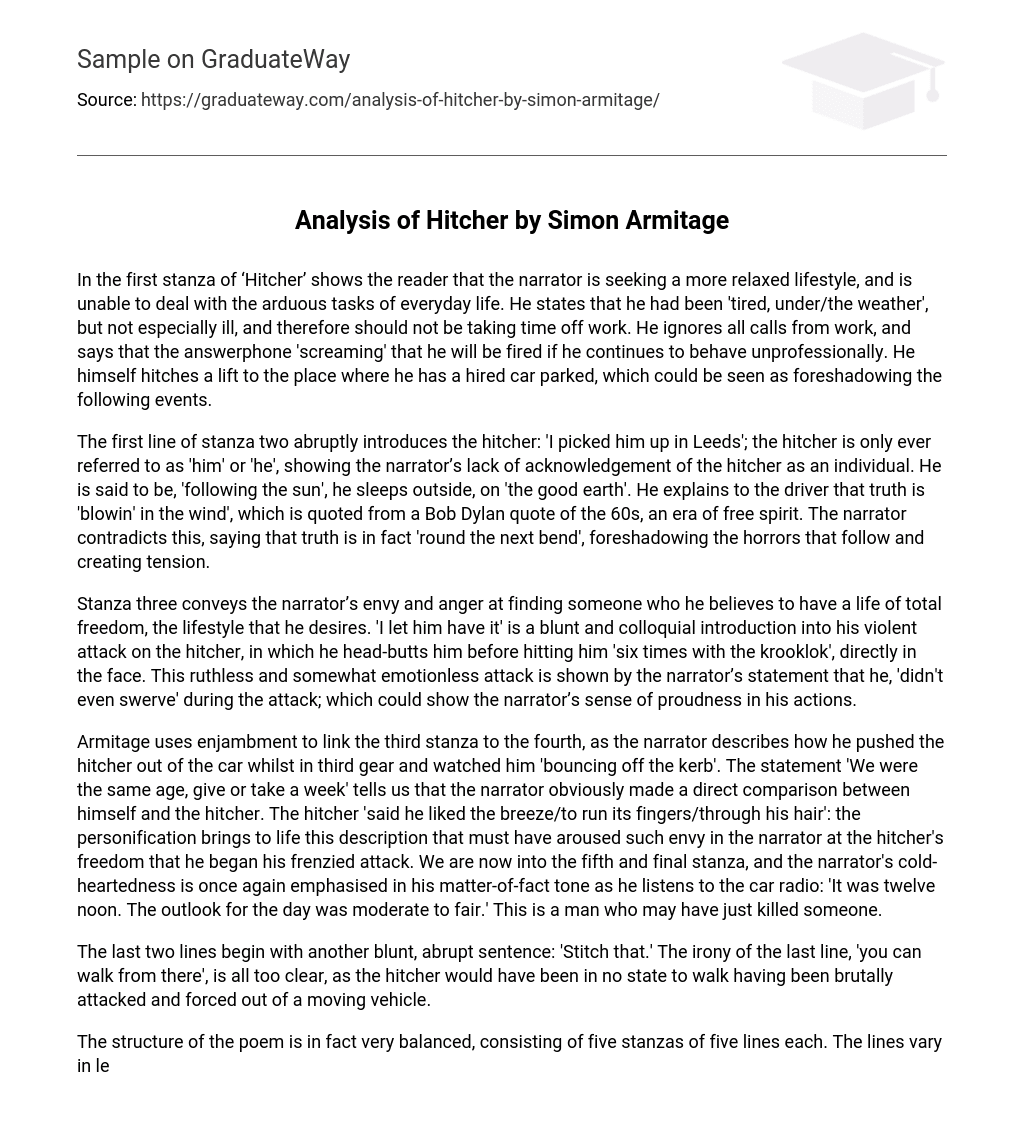In the first stanza of ‘Hitcher’ shows the reader that the narrator is seeking a more relaxed lifestyle, and is unable to deal with the arduous tasks of everyday life. He states that he had been ‘tired, under/the weather’, but not especially ill, and therefore should not be taking time off work. He ignores all calls from work, and says that the answerphone ‘screaming’ that he will be fired if he continues to behave unprofessionally. He himself hitches a lift to the place where he has a hired car parked, which could be seen as foreshadowing the following events.
The first line of stanza two abruptly introduces the hitcher: ‘I picked him up in Leeds’; the hitcher is only ever referred to as ‘him’ or ‘he’, showing the narrator’s lack of acknowledgement of the hitcher as an individual. He is said to be, ‘following the sun’, he sleeps outside, on ‘the good earth’. He explains to the driver that truth is ‘blowin’ in the wind’, which is quoted from a Bob Dylan quote of the 60s, an era of free spirit. The narrator contradicts this, saying that truth is in fact ’round the next bend’, foreshadowing the horrors that follow and creating tension.
Stanza three conveys the narrator’s envy and anger at finding someone who he believes to have a life of total freedom, the lifestyle that he desires. ‘I let him have it’ is a blunt and colloquial introduction into his violent attack on the hitcher, in which he head-butts him before hitting him ‘six times with the krooklok’, directly in the face. This ruthless and somewhat emotionless attack is shown by the narrator’s statement that he, ‘didn’t even swerve’ during the attack; which could show the narrator’s sense of proudness in his actions.
Armitage uses enjambment to link the third stanza to the fourth, as the narrator describes how he pushed the hitcher out of the car whilst in third gear and watched him ‘bouncing off the kerb’. The statement ‘We were the same age, give or take a week’ tells us that the narrator obviously made a direct comparison between himself and the hitcher. The hitcher ‘said he liked the breeze/to run its fingers/through his hair’: the personification brings to life this description that must have aroused such envy in the narrator at the hitcher’s freedom that he began his frenzied attack. We are now into the fifth and final stanza, and the narrator’s cold-heartedness is once again emphasised in his matter-of-fact tone as he listens to the car radio: ‘It was twelve noon. The outlook for the day was moderate to fair.’ This is a man who may have just killed someone.
The last two lines begin with another blunt, abrupt sentence: ‘Stitch that.’ The irony of the last line, ‘you can walk from there’, is all too clear, as the hitcher would have been in no state to walk having been brutally attacked and forced out of a moving vehicle.
The structure of the poem is in fact very balanced, consisting of five stanzas of five lines each. The lines vary in length but follow the same pattern in each stanza, beginning with a short one, increasing in length until the third line, and gradually decreasing in the fourth and fifth. The only rhymes in the poem are lines three and five in the first stanza (‘fired’ and ‘hired’), and lines three and five in the final stanza (‘fair’ and ‘there’).
This is a first-person narrative reflecting different extremes in society: two men of the same age, one of whom has succeeded in escaping the rat-race, the other caught up in it but unable to face up to its demands and threatened with losing his job. Confronted by someone who has found the freedom he so covets, the narrator cannot bear listen to him or see him sitting beside him. Envy, pent-up anger and violence are unleashed. One man may be dead; the other is unrepentent, devoid of emotion





